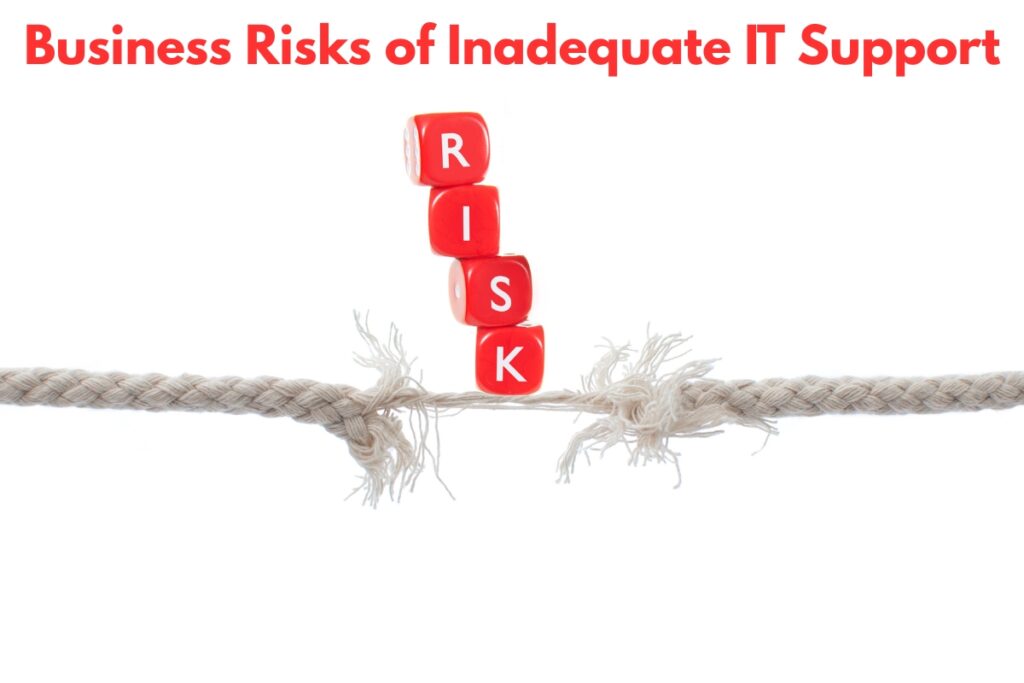Ever had your entire office grind to a halt because the internet went down? Or maybe you’ve faced that stomach-dropping moment when important client files suddenly vanished?
These aren’t just annoying tech problems – they’re business emergencies that directly impact your bottom line. Yet surprisingly, many businesses still treat technology as an afterthought rather than a critical infrastructure. In today’s digital world, professional IT services aren’t a luxury – they’re essential for any modern business.
Let’s explore why proper technology support has become non-negotiable, especially for regulated industries.
Why Are IT Services Important for Modern Businesses?

Modern businesses depend entirely on technology for virtually everything they do. From client communications to document management, payment processing, and service delivery, technology has become the backbone of daily operations. The professional importance of IT services extends beyond simple technical support.
Quality IT services ensure your technology works reliably, stays secure from cyber threats, meets regulatory requirements, and supports business growth. Without proper support, businesses face frequent downtime, security vulnerabilities, compliance risks, and productivity losses that damage their bottom line.
The difference between professional IT management and a reactive “fix it when it breaks” approach is like the difference between preventive healthcare and emergency room visits. One helps maintain operations smoothly; the other leaves you constantly dealing with expensive emergencies.
The Critical Role IT Services Play in Business Operations
Your staff depends on functioning technology every single day. Email, document management, client databases, and accounting systems – none of these work without proper technology infrastructure and support.
When these systems fail, productivity plummets and client service suffers. With cyber attacks targeting businesses of all sizes, professional IT services provide crucial protection for sensitive data. According to the National Cybersecurity Alliance, 60% of small companies go out of business within six months of a data breach.
The importance of managed IT services becomes clear when considering these statistics – professional services implement multiple security layers, including networking tools, advanced threat protection, and security awareness training. Regulated industries face strict requirements for data handling.
Law firms, healthcare providers, and financial services must maintain specific security controls and documentation. Professional IT ensures these requirements are met, helping you avoid costly fines and penalties. When disasters strike – whether ransomware, hardware failure, or natural disasters – professional IT services ensure your business can recover quickly through proper backup systems and tested recovery procedures. This protection is critical for business survival in today’s threat landscape.
Business Risks of Inadequate IT Support

Businesses without proper IT services face serious risks:
- Costly Downtime – Average costs range from $8,000 to $74,000 per hour, according to Gartner research. This includes lost productivity, revenue, and recovery expenses.
- Data Breaches – Unpatched systems and weak security lead to breaches that average $150-$200 per compromised record in direct costs, according to the IBM Cost of a Data Breach Report, not counting reputation damage.
- Compliance Violations – HIPAA penalties can reach $50,000 per violation. Legal firms failing to protect client data face bar complaints and malpractice claims.
- Data Loss – Without proper backups, businesses face permanent loss of critical data. According to FEMA, 40% of businesses never reopen after a disaster, and another 25% fail within one year.
- Inability to Compete – Businesses struggling with unreliable technology can’t keep pace with competitors who leverage modern IT solutions.
For professional service firms, these risks are amplified by client expectations for data security and potential liability when technology failures impact client matters. Understanding the distinction between data security vs cyber security becomes crucial in managing these risks effectively.
Key Benefits of Managed IT Services
The benefits of managed IT services deliver several critical advantages to modern businesses:
Proactive Monitoring Prevents Costly Downtime
Rather than waiting for systems to fail, managed IT services use network availability monitoring to detect and resolve issues before they cause business disruptions. This 24/7 monitoring identifies potential problems like failing hardware or unusual network activity before they impact your operations. This proactive approach is like having a check engine light for your entire technology infrastructure.
The result?
Fewer emergencies, less downtime, and more productive staff. Various types of network monitoring help identify potential issues before they become business crises.
Enhanced Security and Compliance Protection
Professional IT services provide comprehensive cybersecurity protection, including:
| Security Layer | Function | Business Benefit |
| Endpoint Protection | Advanced malware defense | Prevents ransomware and data theft |
| Email Security | Filters malicious messages | Blocks phishing attacks targeting staff |
| Patch Management | Keeps systems updated | Eliminates vulnerabilities that hackers exploit |
| Network Security | Firewall and intrusion detection | Prevents unauthorized system access |
| Security Training | Staff awareness | Reduces human error, your biggest security risk |
For regulated industries, IT services provide critical compliance expertise in requirements like HIPAA for healthcare, ABA cybersecurity guidelines for law firms, and PCI for payment processing.
Predictable Costs and Budget Control
One significant benefit of IT support services is predictable monthly costs versus unpredictable emergency expenses. This flat-rate model typically costs less than emergency support while providing more comprehensive coverage.
This predictability allows better budget planning without sudden, expensive surprises. For small to mid-sized businesses, this cost stability is particularly valuable for cash flow management.
Access to Specialized Expertise
Professional IT services provide access to a team of specialists with diverse expertise rather than relying on a single IT person. This team approach brings together experts in monitoring tools, security, compliance, cloud services, and business applications.
This breadth of knowledge solves complex problems and implements advanced solutions that wouldn’t otherwise be available to most businesses. Many 10 benefits of managed IT services white papers highlight this access to enterprise-level expertise as a primary advantage for smaller organizations.
Scalability Supporting Business Growth
As your business grows, your technology needs to grow with it. Professional IT services enable you to scale technology to match business expansion, add locations or employees seamlessly, and adopt new technologies without infrastructure constraints.
This scalability ensures your systems support your success rather than limiting it. Understanding network firewall security benefits becomes increasingly important as your business scales and faces new security challenges.
Why Professional Services and Regulated Industries Need Specialized IT Support
Law firms, healthcare practices, and other professional services have unique IT requirements:
- Strict Compliance Requirements – Regulations governing client data demand specialized knowledge and implementation of specific controls.
- Heightened Security Needs – Sensitive client information creates an attractive target for hackers, requiring enhanced security measures.
- Professional Liability Concerns – Technology failures that impact client matters can create liability issues unique to service providers.
Generic IT support often lacks the compliance expertise these businesses require. Specialized IT providers understand both the technical and regulatory landscape affecting your industry.
The managed services ‘ (advantages) are particularly significant for regulated businesses requiring both technical support and compliance expertise.
Importance of IT Services for Business Continuity
When ransomware strikes, hardware fails, or disasters occur, proper backup systems become the difference between a temporary disruption and a business-ending catastrophe. Many businesses believe they have adequate protection because they have “backups,” but discover too late that those backups are incomplete or corrupted. Professional IT services implement comprehensive data backup and recovery in cloud computing solutions that include:
- Regular, automated backups of all critical systems
- Multiple backup locations, including off-site storage
- Regular testing to verify recovery will work
- Documented recovery procedures for different scenarios
- Rapid recovery options to minimize downtime
This protection provides the insurance policy every business needs against increasingly common disasters like ransomware attacks.
How to Determine If Your Business Needs Professional IT Services
Consider these warning signs:
- Your staff regularly experiences technology problems, interrupting their work
- You worry about cybersecurity, but aren’t confident in your current protection
- You have compliance requirements, but aren’t sure if you’re meeting them
- Technology problems take too long to resolve, impacting client service
- You’re concerned about data loss or the inability to recover from disasters
- IT costs are unpredictable, with expensive emergency repairs
- Your business is growing, but technology isn’t keeping pace
- Staff members spend significant time dealing with IT issues
The more indicators that apply, the more likely you need professional IT support. This is especially true for professional services firms where technology failures carry higher costs and compliance risks.
People Also Ask:
What is the difference between IT services and managed IT services?
IT services are typically referred to as-needed technical support. Managed IT services provide comprehensive, proactive technology management, including 24/7 monitoring, security, and support for a predictable monthly fee.
How much do managed IT services cost?
Costs typically range from $100-$250 per user per month, depending on business size, complexity, and specific services. This often costs less overall when accounting for reduced downtime and fewer emergencies.
Do small businesses need managed IT services?
Small businesses often benefit most from managed IT as they lack internal IT departments, but face the same security threats as larger companies. Professional services firms particularly need proper support due to compliance requirements.
What should be included in IT support services?
Comprehensive IT support should include monitoring and alerting, security management, backup and recovery, help desk support, maintenance, vendor management, strategic planning, and compliance assistance.
Wrapping Up
Professional IT services have evolved from a luxury to a necessity for modern businesses, particularly those handling sensitive information. The right technology partner doesn’t just fix problems – they prevent them, protect your data, ensure compliance, and enable growth.
With cybersecurity threats increasing and technology becoming more complex, trying to manage IT without professional support puts your business at unnecessary risk. The question isn’t whether you can afford IT services – it’s whether you can afford to go without them.
Ready to explore how professional IT services can protect and empower your business? Contact Rekall Tech today for a comprehensive technology assessment that will identify your specific needs and vulnerabilities.


